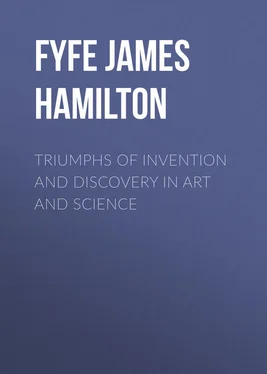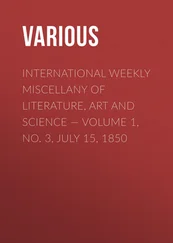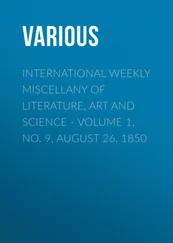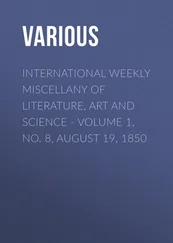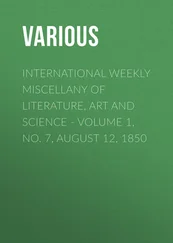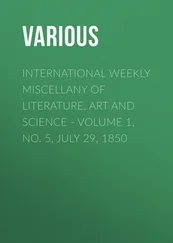James Fyfe - Triumphs of Invention and Discovery in Art and Science
Здесь есть возможность читать онлайн «James Fyfe - Triumphs of Invention and Discovery in Art and Science» — ознакомительный отрывок электронной книги совершенно бесплатно, а после прочтения отрывка купить полную версию. В некоторых случаях можно слушать аудио, скачать через торрент в формате fb2 и присутствует краткое содержание. Жанр: foreign_antique, foreign_prose, на английском языке. Описание произведения, (предисловие) а так же отзывы посетителей доступны на портале библиотеки ЛибКат.
- Название:Triumphs of Invention and Discovery in Art and Science
- Автор:
- Жанр:
- Год:неизвестен
- ISBN:нет данных
- Рейтинг книги:4 / 5. Голосов: 1
-
Избранное:Добавить в избранное
- Отзывы:
-
Ваша оценка:
- 80
- 1
- 2
- 3
- 4
- 5
Triumphs of Invention and Discovery in Art and Science: краткое содержание, описание и аннотация
Предлагаем к чтению аннотацию, описание, краткое содержание или предисловие (зависит от того, что написал сам автор книги «Triumphs of Invention and Discovery in Art and Science»). Если вы не нашли необходимую информацию о книге — напишите в комментариях, мы постараемся отыскать её.
Triumphs of Invention and Discovery in Art and Science — читать онлайн ознакомительный отрывок
Ниже представлен текст книги, разбитый по страницам. Система сохранения места последней прочитанной страницы, позволяет с удобством читать онлайн бесплатно книгу «Triumphs of Invention and Discovery in Art and Science», без необходимости каждый раз заново искать на чём Вы остановились. Поставьте закладку, и сможете в любой момент перейти на страницу, на которой закончили чтение.
Интервал:
Закладка:
It cost him ten long weary years of patient speculation and experiment, to carry out the idea, with little hope to buoy him up, for to the last he used to say "his fear was always equal to his hope," – and with all the cares and embarrassments of his precarious trade to perplex and burden him. Even when he had his working model fairly completed, his worst difficulties – the difficulties which most distressed and harassed the shy, sensitive, and retiring Watt – seemed only to have commenced. To give the invention a fair practical trial required an outlay of at least £1000; and one capitalist, who had agreed to join him in the undertaking, had to give it up through some business losses. Still Watt toiled on, always keeping the great object in view, – earning bread for his family (for he was married by this time), by adding land-surveying to his mechanical labours, and, in short, turning his willing hand to any honest job that offered.
He got a patent in 1769, and began building a large engine; but the workmen were new to the task, and when completed, its action was spasmodic and unsatisfactory. "It is a sad thing," he then wrote, "for a man to have his all hanging by a single string. If I had wherewithal to pay for the loss, I don't think I should so much fear a failure; but I cannot bear the thought of other people becoming losers by my scheme, and I have the happy disposition of always painting the worst." And just then, to make matters still more gloomy, he learned that some rascally linen-draper in London was plagiarizing the great invention he had brought forth in such sore and protracted travail. "Of all things in the world," cried poor Watt, sick with hope deferred, and pressed with little carking cares on every side, "there is nothing so foolish as inventing."
When nearly giving way to despair, and on the point of abandoning his invention, Watt was fortunate enough to fall in with Matthew Boulton, one of the great manufacturing potentates of Birmingham, an energetic, far-seeing man, who threw himself into the enterprise with all his spirit; and the fortune of the invention was made. An engine, on the new principle, was set up at Soho; and there Boulton and Watt sold, as the former said to Boswell, "what all the world desires to have, Power;" – the infinite power that animates those mighty engines, which —
"England's arms of conquest are,
The trophies of her bloodless war:
Brave weapons these.
Victorious over wave and soil,
With these she sails, she weaves, she tills,
Pierces the everlasting hills,
And spans the seas."
Watt's engine, once fairly started, was not long in making its way into general use. The first steam-engine used in Manchester was erected in 1790; and now it is estimated that in that district, within a radius of ten miles, there are in constant work more than fifty thousand boilers, giving a total power of upwards of one million horses. And the united steam power of Great Britain is considered equal to the manual labour of upwards of four hundred millions of men, or more than double the number of males on the face of the earth. From the factory at Soho, Watt's improved engines were dispersed all over the country, especially in Cornwall – the firm receiving the value of a third part of the coal saved by the use of the new machine. In one mine, where there were three pumps at work, the proprietors thought it worth while, it is said, to purchase the rights of the inventors, at the price of £2500 yearly for each engine. The saving, therefore, on the three engines, in fuel alone, must have been at least £7500 a year.
In the first year of the present century, Watt withdrew himself entirely from business; but though he lived in retirement, he did not let his busy mind get rusty or sluggish for want of exercise. At one time he took it into his head that his faculties were declining, and though upwards of seventy years of age, he resolved to test his mental powers by taking up some new subject of study. It was no easy matter to find one quite new to him, so wide and comprehensive had been his range of study; but at length the Anglo-Saxon tongue occurred to him, and he immediately applied himself to master it, the facility with which he did so, dispelling all doubt as to the failing of his stupendous intellect. He thus busied himself in various useful and entertaining pursuits, till close upon his death, which took place in 1819.
Extraordinary as was Watt's inventive genius, his wide range of knowledge, theoretic and practical, was equally so. Great as is the "idea" with which his name is chiefly associated, he was not a man of one idea, but of a thousand. There was hardly a subject which came under his notice which he did not master; and, as was said of him, "it seemed as if every subject casually started by him had been that he had been occupied in studying." He had no doubt a rapid faculty of acquiring knowledge; but he owed the versatility and copiousness of his attainments above all to his unwearied industry. He was always at work on something or other, and he may truly be called one of those who —
"Could Time's hour-glass fall,
Would, as for seed of stars, stoop for the sand,
And by incessant labour gather all."
In a recent volume of memoirs by Mrs. Schimmel Pennick, we find the following graphic sketch of this extraordinary man: – "He was one of the most complete specimens of the melancholic temperament. His head was generally bent forward or leaning on his hand in meditation, his shoulders stooping, and his chest falling in, his limbs lank and unmuscular, and his complexion sallow. His utterance was slow and impassioned, deep and low in tone, with a broad Scotch accent; his manners gentle, modest, and unassuming. In a company where he was not known, unless spoken to, he might have tranquilly passed the whole time in pursuing his own meditations. When he entered the room, men of letters, men of science, many military men, artists, ladies, and even little children, thronged around him. I remember a celebrated Swedish artist being instructed by him that rat's whiskers made the most pliant painting-brushes; ladies would appeal to him on the best modes of devising grates, curing smoking chimneys, warming their houses, and obtaining fast colours."
His reading was singularly extensive and diversified. He perused almost every work that came in his way, and used to say that he never opened a book, no matter what its subject or worth, without learning something from it. He had a vivid imagination, was passionately fond of fiction, and was a very gifted story-teller himself. When a boy, staying with his aunt in Glasgow, he used every night to enthral the attention of the little circle with some exciting narrative, which they would not go to bed till they had heard the end of; and kept them in such a state of tremor and excitement, that his aunt used to threaten to send him away.
Since Watt's time, innumerable patents have been taken out for improvements in the steam engine; but his great invention forms the basis of nearly all of them, and the alterations refer rather to details than principles of action. The application of steam to locomotive purposes, however, led to the construction of the high pressure engine, in which the cumbrous condensing apparatus is dispensed with, and motion imparted to the piston by the elastic power of the steam being greater than that of the atmosphere.
The Manufacture of Cotton
"Are not our greatest men as good as lost? The men who walk daily among us, clothing us, warming us, feeding us, walk shrouded in darkness, mere mythic men." – Carlyle.
I. – KAY AND HARGREAVES
On the 3d of May 1734, there was a hanging at Cork which made a good deal more noise than such a very ordinary event generally did in those days. There was nothing remarkable about the malefactor, or the crime he had committed. He was a very commonplace ruffian, and had earned his elevation to the gallows by a vulgar felony. What was remarkable about the affair was, that the woollen weavers of Cork, being then in a state of great distress from want of work, dressed up the convict in cotton garments, and that the poor wretch, having once been a weaver himself, "employed" the last occasion he was ever to have of addressing his fellow creatures, by assuring them that all his misdeeds and misfortunes were to be traced to the "pernicious practice of wearing cottons." "Therefore, good Christians," he continued, "consider that if you go on to suppress your own goods, by wearing such cottons as I am now clothed in, you will bring your country into misery, which will consequently swarm with such unhappy malefactors as your present Object is; and the blood of every miserable felon that will hang after this warning from the gallows will lie at your doors."
Читать дальшеИнтервал:
Закладка:
Похожие книги на «Triumphs of Invention and Discovery in Art and Science»
Представляем Вашему вниманию похожие книги на «Triumphs of Invention and Discovery in Art and Science» списком для выбора. Мы отобрали схожую по названию и смыслу литературу в надежде предоставить читателям больше вариантов отыскать новые, интересные, ещё непрочитанные произведения.
Обсуждение, отзывы о книге «Triumphs of Invention and Discovery in Art and Science» и просто собственные мнения читателей. Оставьте ваши комментарии, напишите, что Вы думаете о произведении, его смысле или главных героях. Укажите что конкретно понравилось, а что нет, и почему Вы так считаете.
